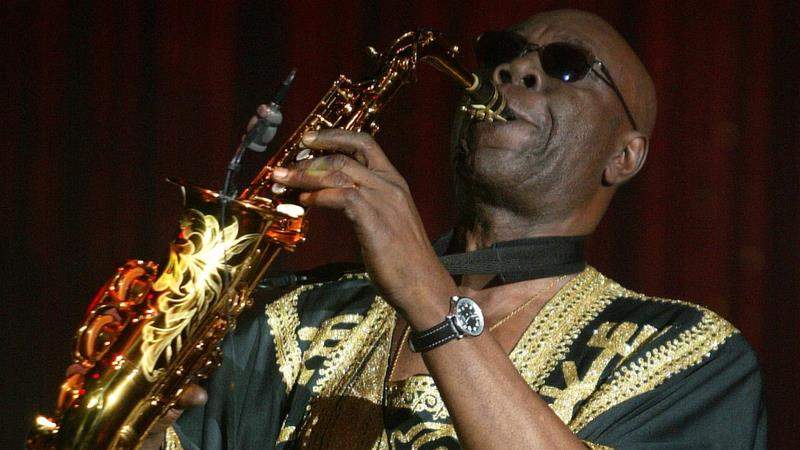Manu Dibango, the Cameroonian saxophonist and jazz musician known as Papy Groove, anAfro-jazz legend and among the world’s most celebrated African music stars, passed away yesterday in Paris at the age of 86. He had been admitted to a hospital in the French capital last week after being found positive for Covid-19.
Born in Douala, Cameroon, as Emmanuel N’Djoké Dibango on Dec. 12, 1933, he came from a well-to-do Protestant family and began singing as a child in his church choir, but thanks to the gramophone the family had at home he became interested in French, American, and Cuban music as a young boy. After his studies in Cameroon he moved at the age of sixteen to Marseille where he spent his adolescence. Moving to Chartres and then to Château-Thierry for study in the early 1950s (he had in fact decided to pursue literary studies), he discovered jazz here in northern France and learned to play the mandolin and piano, later switching to the saxophone: he became a pupil of Francis Bebey, his compatriot saxophonist who had already emigrated to France, and began performing in a number of private clubs between France and Belgium.
It was precisely between Brussels, Antwerp and Charleroi that his style began to be formed, thanks to African immigrants, from the Belgian Congo, who had grafted the music of their homelands onto that of the West: thus, Manu Dibango’s jazz also began to incorporate African elements. In the 1960s he played in the orchestra of Congolese jazz musician Grand Kallé and performed with him in clubs in France and Belgium, until he founded his first band in 1967. His first album, Saxy Party, was released in 1969, but the big hit came in 1972 with Soul Makossa, an album that contained the hit of the same name, a frenetic jazz-funk with African elements that first climbed the French charts and then conquered the entire world, even entering the Billboard Hot 100 at number 35. Soul Makossa has influenced many artists (Michael Jackson and Rihanna sampled the very famous “ma-ma-ko ma-ma-ssa ma-ko-ma-ko-ssa” verse in Wannabe startin’ something and Don’t stop the music, respectively: a dispute would later ensue in 2009 because the two American artists had not asked for permission to use Manu Dibango’s song) and has experienced an endless number of covers and remixes, the last of which, made by Yolanda Be Cool, was a hit in every club in Europe in 2015.
Manu Dibango’s career continued at the rate of one LP a year throughout the 1970s and 1980s, while the 1990s were those of major collaborations (for him, who, already in the previous decade, had accompanied Serge Gainsbourg): thus, Manu Dibango worked with artists such as Peter Gabriel, Youssou N’Dour, Sinéad O’Connor, Dominic Miller, Salif Keita, and many others. In 1997 he started the Soirs au Village Festival in Saint-Calaise, a village in central France, named after the title of one of his songs and which has since become an annual event. His performances in recent years had become much more sporadic, but the artist had continued to produce: his latest record, Balade en Saxo, is from 2013. For his merits in the field of music, he was awarded the Legion of Honor by the French republic on July 14, 2010.
 |
| Farewell to Manu Dibango, disappears the legendary Papy Groove of afro-jazz |
Warning: the translation into English of the original Italian article was created using automatic tools. We undertake to review all articles, but we do not guarantee the total absence of inaccuracies in the translation due to the program. You can find the original by clicking on the ITA button. If you find any mistake,please contact us.